【交通运输】实用英语第一册教案上海交通大学出版社
实用大学英语第一册_教案

一、课程简介《实用大学英语第一册》是为非英语专业学生设计的大学英语基础课程,旨在帮助学生掌握英语基本语法、词汇和口语表达,提高学生的英语听说读写能力,为后续英语学习打下坚实的基础。
二、教学目标1. 知识目标:(1)掌握英语基本语法和词汇;(2)了解英语国家的基本文化背景;(3)提高英语听、说、读、写能力。
2. 能力目标:(1)能够进行简单的英语口语交流;(2)能够阅读和理解英语短文;(3)能够运用所学知识进行写作。
3. 素质目标:(1)培养学生良好的英语学习习惯;(2)提高学生的自主学习能力;(3)增强学生的跨文化交际意识。
三、教学内容1. 单元一:问候与介绍2. 单元二:日常用语3. 单元三:购物4. 单元四:饮食5. 单元五:交通6. 单元六:天气与气候7. 单元七:工作与职业8. 单元八:娱乐与休闲9. 单元九:旅行10. 单元十:家庭与朋友四、教学方法1. 讲授法:教师讲解英语语法、词汇和口语表达,帮助学生掌握基础知识;2. 演示法:教师通过实际操作演示,让学生直观地了解英语口语和写作技巧;3. 讨论法:鼓励学生积极参与课堂讨论,提高学生的口语表达能力;4. 案例分析法:结合实际生活案例,让学生了解英语国家文化背景;5. 角色扮演法:通过模拟真实场景,让学生在实际语境中运用所学知识。
五、教学进度安排1. 第一周:导入课程,介绍课程内容、教学目标和方法;2. 第二至四周:学习单元一至三,重点掌握问候、介绍和日常用语;3. 第五至七周:学习单元四至六,重点掌握购物、饮食和天气与气候;4. 第八至十周:学习单元七至十,重点掌握工作与职业、娱乐与休闲、旅行和家庭与朋友;5. 第十一周:进行期中考试,检验学生的学习成果;6. 第十二至十三周:复习巩固所学知识,进行期末考试。
六、教学评价1. 课堂表现:包括出勤、课堂发言、参与讨论等;2. 作业完成情况:包括课堂作业、课后作业等;3. 考试成绩:包括期中考试、期末考试等;4. 学生自评:学生对自己的学习情况进行自我评价。
实用英语第一册unit4课后答案
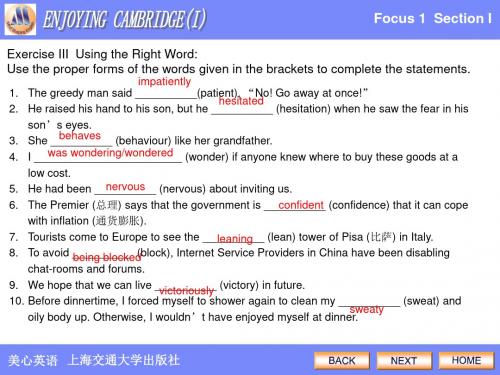
a. The kid __w_e_n_t__ into his room and shut the door. b. She tried to blow out all the candles on the cake in one __g_o_. (3) rest n. & vi. a. You may take a __r_e_s_t __ after that class. b. I see a bird __r_e_st_in_g_ on the roof. (4) drink n. & vt. a. Are there any soft _d_r_in_k_s__ in the refrigerator? b. She __d_r_in_k_s_ milk before going to bed every night. (5) feel n. & vi. a. I _a_m_ not __fe_e_l_in_g_ well now, so I can’t dine out with you. b. The _______ of the meeting is tense.
美心英语 上海交通大学出版社
Focus 1 Section I
Exercise VII.1 Translation: Translate the following sentences into Chinese. (1) She’s been dating him for months but she’s still not very serious. 她__跟_他__约__会__几__个_月__了__,__但__她__还_不__是__很__认__真_。____ (2) Tom came close to falling off the high wall. 汤__姆__差__点__从_高__墙__上__跌__下__来_。________________ (3) He goes for the world record. _他__想_创__造__世__界__纪_录__。______________________ (4) The magician escaped from the cage with his hands tied behind his back. _魔__术_师__双__手__反__绑_着__从__笼__子__里__逃_了__出__来__。_______ (5) She must have had a cold, for she had a fever and a runny nose. 她__一__定__是__感_冒__了__,__因__为__她_发__烧__,__还__流_鼻__涕__。____
应用型大学英语综合教程第一册第三章课件

F. With his severance payment. G. With the money given by his children. H. With the money left by his parents. I. With his savings.
M: Because I was much hurt from last year’s job seeking experience. You know what the two bosses said to me? They said directly to my face, “You look very tired.” “You look run down.” I’m tired of it.
The Beginning (Paras. 1-4)
More and more unemployed people are spending their severance pay on plastic surgery.
Body (Paras. 5-16)
Senior people, together with some professionals and high executives, in order to get a competitive advantage in job-seeking, are undergoing plastic surgery too.
The End (Paras. 17-19)
The effect of plastic surgery and other forms of cosmetic treatment is still not clear.
新编实用英语第一册教案
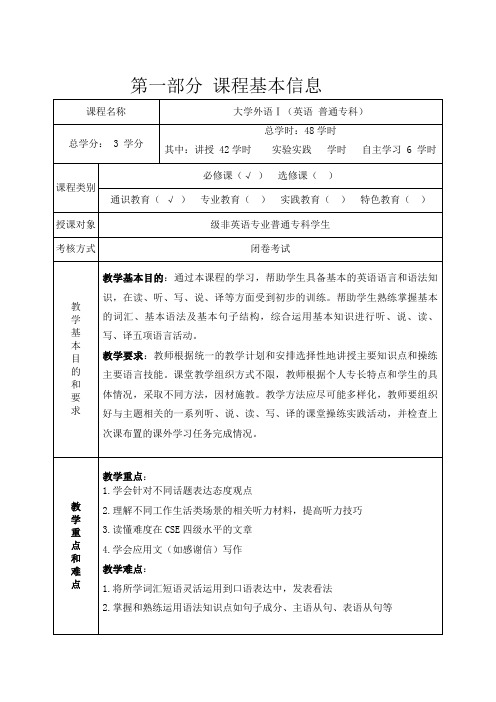
第一部分课程基本信息第二部分教学设计一、课程与教材分析(一)课程分析《大学英语》是高等教育的一个有机组成部分,是大学生的一门必修的基础课程。
大学英语教学是以英语语言知识与应用技能、学习策略和跨文化交际为主要内容;以外语教学理论为指导,并集多种教学模式和教学手段为一体的教学体系,旨在培养学生英语综合应用能力,特别是听说能力,使他们在今后工作和社会交往中能用英语有效地进行口头和书面的信息交流,同时增强其自主学习能力、提高综合文化素养,以适应我国经济发展和国际交流的需要。
(二)教材分析(突出针对课程需要,合理选择教材和教参)《新编实用英语》(第五版)系列教材国家“十三五”规划教材,是严格按照国家职业教育目标和要求精心设计的立体化公共外语教材,教材内容贴合日常交际和职场需求,在主题类别、语篇类型、语言知识、文化知识等方面均与《新课标》紧密对应,历经多年教学实践,得到了广大高职高专院校师生的充分认可。
教材立足“立德树人”根本教育任务,探索外语“课程思政”建设,注重中华优秀文化的表达,助力培养德才兼备、德智体美劳全面发展的人;注重培养学生的英语学科核心素养,助力学生形成关键能力和必备品格以及形成正确的世界观、人生观和价值观,努力将大英教材的思想价值渗透作用最大化,以美育人、以德润人,以文化人,潜移默化中引导学生坚定“四个自信”,润物无声中实现“育人育才”。
教材聚焦典型生活和职业场景,以富有生活化、职业性和时代性的选材,将英语技能放在职业场景中操练,注重对学生英语基本功和职业技能的全面培养,并创设“线上+ 线下”混合式外语教学生态,资源以立体化、多模态形式呈现,是比较适合我校学生实际的教材。
二、学生情况分析(一)学生基本情况本课程是面向我校非英语专业普通专科学生的公共必修课,所教大部分学生有较强的学习积极性、主动性和自觉性,具备比较基本的英语阅读和简单写作的能力,但是听力水平普遍较低,词汇量相对有限,在写作和翻译方面能力较为欠缺。
交通运输专业英语PPT教案

种类型的发动机。
An sectional engine view of a typical spark ignition petrol engine is shown in Fig.2.1, detailing the major components.
into the cylinder.
partial:部分的,不完全的;不公平的,偏袒的 vacuum:真空,真空度
活塞运动引起的不完全真空使空燃混合气从进气管经进气门冲入到
气缸。
The correct air-fuel mixture is provided by the carburetor.
精确的空气燃油混合气是由化油器所提供。
When the piston reaches the end of its stroke the inlet valve closes,
sealing the top end of the cylinder as both valves are closed.
第一个end:终点,终了; 第二个end:端面,端部
throttle n.节流阀
depression n.降低,下降,衰减
pivot n.枢轴,支点
vi,在枢轴上传动;vt.装枢轴于
tilt v.倾斜,翻转
principle:原则,原理;准则,道义 principal:主要的,首要的
vacuum:真空,真空度
revolution:革命,循环,周期
实用英语1册教案
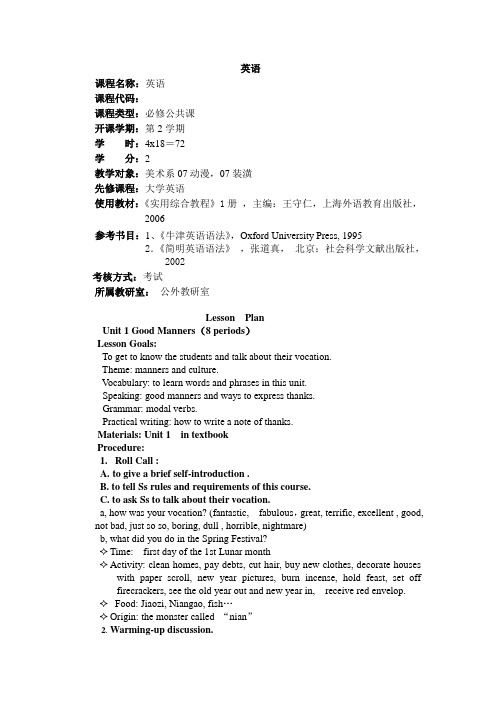
英语课程名称:英语课程代码:课程类型:必修公共课开课学期:第2学期学时:4x18=72学分:2教学对象:美术系07动漫,07装潢先修课程:大学英语使用教材:《实用综合教程》1册,主编:王守仁,上海外语教育出版社,2006参考书目:1、《牛津英语语法》,Oxford University Press, 19952.《简明英语语法》,张道真,北京:社会科学文献出版社,2002考核方式:考试所属教研室:公外教研室Lesson PlanUnit 1 Good Manners(8 periods)Lesson Goals:To get to know the students and talk about their vocation.Theme: manners and culture.V ocabulary: to learn words and phrases in this unit.Speaking: good manners and ways to express thanks.Grammar: modal verbs.Practical writing: how to write a note of thanks.Materials: Unit 1 in textbookProcedure:1.Roll Call :A.to give a brief self-introduction .B. to tell Ss rules and requirements of this course.C. to ask Ss to talk about their vocation.a, how was your vocation? (fantastic, fabulous,great, terrific, excellent , good, not bad, just so so, boring, dull , horrible, nightmare)b, what did you do in the Spring Festival?✧Time: first day of the 1st Lunar month✧Activity: clean homes, pay debts, cut hair, buy new clothes, decorate houseswith paper scroll, new year pictures, burn incense, hold feast, set off firecrackers, see the old year out and new year in, receive red envelop.✧Food: Jiaozi, Niangao, fish…✧Origin: the monster called “nian”2. W arming-up discussion.A Can you name anything related with "manners"?Greetings, polite, shake hands, avoid certain topics , courtesy, patient ...B What kind of behavior do you think is good manners for a man?a.He should help her get in and out of cars. ( )b.He should pay the dinner everytime. ( )c.He should walk on the outside of a woman on the sidewalk.( )d.He should pull the chair out for her before sitting down himself. ( )e.He should never resort to violent means. ( )3. Study of words and expressions in the Text A.A Help Ss read the words.B Study of words and expressions in the Text A.a.Underline the new words and phrases in text and try to understand itsmeaning.b.K ey words and expressions.C Vocabulary check (B and C)4. Discussion of Text A and the following-up exercises..A. Ss watch the video clip and answer questions.B. T helps Ss understand the text and difficult sentences.C. Ss finish the following-up exercises5. 7. Grammar tips: modal verbs.A.T asks Ss to tell the types of modal verbs in their own words.B.T gives Ss some examples and helps Ss get rules about it.C. Ss finish exercises.6. Discussion of Text B and the following-up exercises.A. Warming up: T asks Ss to answer Comprehensive questions.B. Study of words and expressions in the Text B.C. Detailed study of the text.D. Ss finish the following-up exercises .prehensive exercises.8. Homework: write a note of thanks.Unit2 Living Environment(8periods)Lesson Goals:Theme:enviromental protection.V ocabulary: to learn words and phrases in this unit.Speaking: how to make our living enviroment beautiful and comfortable. Grammar:the adverbial clause of time.Practical writing: how to write a note of apology.Materials: Unit 2 in textbookProcedure:1. Roll Call :2. W arming-up discussion.A. Can you name anything related with "enviroment"?Chemical, waste, pollution, population...B. Disscussion: how to make our living enviroment beautiful and comfortable.3. Study of words and expressions in the Text A.A. Help Ss read the words.B. Study of words and expressions in the Text A.a.Underline the new words and phrases in text and try to understand itsmeaning.b.K ey words and expressions.C. V ocabulary check (B and C)4. Discussion of Text A and the following-up exercises..A. Ss watch the video clip and answer questions.B. T helps Ss understand the text and difficult sentences.C. Ss finish the following-up exercises5. Grammar tips: the adverbial clause of time .A. T asks Ss to tell the types of time expressions in their own words.B. T gives Ss some examples and helps Ss get rules about it.C. Ss finish exercises.6. Discussion of Text B and the following-up exercises.A. Warming up: T asks Ss to answer Comprehensive questions.B. Study of words and expressions in the Text B.C. Detailed study of the text.D. Ss finish the following-up exercises .prehensive exercises.8. Homework: write a note of apology.Unit3 Fast Food(8periods)Lesson Goals:Theme:healthy eating habits.V ocabulary: to learn words and phrases in this unit.Speaking: western and Chinese foods and drinks.Grammar:the adverbial clause of purpose.Practical writing: how to write a note of congratulation.Materials: Unit 3 in textbookProcedure:1. Roll Call :2. W arming-up discussion.A. Can you name anything related with "food"?Diet, health, habit, flour, fruit...B. Disscussion: differences between western and Chinese foods and drinks.3. Study of words and expressions in the Text A.A. Help Ss read the words.B. Study of words and expressions in the Text A.a.Underline the new words and phrases in text and try to understand itsmeaning.b.K ey words and expressions.C. V ocabulary check (B and C)4. Discussion of Text A and the following-up exercises..A. Ss watch the video clip and answer questions.B. T helps Ss understand the text and difficult sentences.C. Ss finish the following-up exercises5. Grammar tips: the adverbial clause of purpose .A. T asks Ss to tell the types of adverbial clauses in their own words.B. T gives Ss some examples and helps Ss get rules about it.C. Ss finish exercises.6. Discussion of Text B and the following-up exercises.A. Warming up: T asks Ss to answer Comprehensive questions.B. Study of words and expressions in the Text B.C. Detailed study of the text.D. Ss finish the following-up exercises .prehensive exercises.8. Homework: write a note of apology.Unit 4 Daily shopping(8periods)Lesson Goals:Theme:shopping.V ocabulary: to learn words and phrases in this unit.Speaking: shopping experienceGrammar:the gerund.Practical writing: how to write an anouncement.Materials: Unit 4 in textbookProcedure:1. Roll Call :2. W arming-up discussion.A. Can you name anything related with "shopping"?Customer, queue, check, account, grocery...B. Disscussion: do you have any impressive shoping experience?3. Study of words and expressions in the Text A.A. Help Ss read the words.B. Study of words and expressions in the Text A.a. Underline the new words and phrases in text and try to understand its meaning.b. Key words and expressions.C. V ocabulary check (B and C)4. Discussion of Text A and the following-up exercises..A. Ss watch the video clip and answer questions.B. T helps Ss understand the text and difficult sentences.C. Ss finish the following-up exercises5. Grammar tips: the gerund.A. T asks Ss to tell the feature of the gerund in their own words.B. T gives Ss some examples and helps Ss get rules about it.C. Ss finish exercises.6. Discussion of Text B and the following-up exercises.A. Warming up: T asks Ss to answer Comprehensive questions.B. Study of words and expressions in the Text B.C. Detailed study of the text.D. Ss finish the following-up exercises .prehensive exercises.8. Homework: write a note of apology.Unit 5 Modern Communication(8periods)Lesson Goals:Theme:communication.V ocabulary: to learn words and phrases in this unit.Speaking: benefits and disadvantages of modern communication. Grammar:the infinitive.Practical writing: how to write a notice.Materials: Unit 5 in textbookProcedure:1. Roll Call :2. W arming-up discussion.A. Can you name anything related with "communication"?Hotline, caller, cellphone, telegram, language...B. Disscussion: what're the effecient ways of communication ?3. Study of words and expressions in the Text A.A. Help Ss read the words.B. Study of words and expressions in the Text A.a. Underline the new words and phrases in text and try to understand its meaning.b. Key words and expressions.C. V ocabulary check (B and C)4. Discussion of Text A and the following-up exercises..A. Ss watch the video clip and answer questions.B. T helps Ss understand the text and difficult sentences.C. Ss finish the following-up exercises5. Grammar tips: the infinitive.A. T asks Ss to tell the roles of the infinitive in their own words.B. T gives Ss some examples and helps Ss get rules about it.C. Ss finish exercises.6. Discussion of Text B and the following-up exercises.A. Warming up: T asks Ss to answer Comprehensive questions.B. Study of words and expressions in the Text B.C. Detailed study of the text.D. Ss finish the following-up exercises .prehensive exercises.8. Homework: write a note of notice.Unit 6 Health Care(8periods)Lesson Goals:Theme:health.V ocabulary: to learn words and phrases in this unit.Speaking: How to describe your illness to your doctor?Grammar:the past participle .Practical writing: how to write a name card.Materials: Unit 6 in textbookProcedure:1. Roll Call :2. W arming-up discussion.A. Can you name anything related with "health"?Symptom, liver, cold, fever...B. Disscussion: what do you usually do to maintain healthy?3. Study of words and expressions in the Text A.A. Help Ss read the words.B. Study of words and expressions in the Text A.a. Underline the new words and phrases in text and try to understand its meaning.b. Key words and expressions.C. V ocabulary check (B and C)4. Discussion of Text A and the following-up exercises..A. Ss watch the video clip and answer questions.B. T helps Ss understand the text and difficult sentences.C. Ss finish the following-up exercises5. Grammar tips: the past participle.A. T asks Ss to tell the functions of past participles in their own words.B. T gives Ss some examples and helps Ss get rules about it.C. Ss finish exercises.6. Discussion of Text B and the following-up exercises.A. Warming up: T asks Ss to answer Comprehensive questions.B. Study of words and expressions in the Text B.C. Detailed study of the text.D. Ss finish the following-up exercises .prehensive exercises.8. Homework: write a name card.Unit 7 Generation Gap(8periods)Lesson Goals:Theme:generation gap.V ocabulary: to learn words and phrases in this unit.Speaking: the relationship between you and your parents?Grammar:the relative clause .Practical writing: how to write an invitation letter.Materials: Unit 7 in textbookProcedure:1. Roll Call :2. W arming-up discussion.A. Can you name anything related with "generation gap"?Parent, age, idea, old-fashioned, popular, value...B. Disscussion: how to bridge the generation gap?3. Study of words and expressions in the Text A.A. Help Ss read the words.B. Study of words and expressions in the Text A.a. Underline the new words and phrases in text and try to understand its meaning.b. Key words and expressions.C. V ocabulary check (B and C)4. Discussion of Text A and the following-up exercises..A. Ss watch the video clip and answer questions.B. T helps Ss understand the text and difficult sentences.C. Ss finish the following-up exercises5. Grammar tips: the relative clause.A. T asks Ss to tell the types of the relative clauses in their own words.B. T gives Ss some examples and helps Ss get rules about it.C. Ss finish exercises.6. Discussion of Text B and the following-up exercises.A. Warming up: T asks Ss to answer Comprehensive questions.B. Study of words and expressions in the Text B.C. Detailed study of the text.D. Ss finish the following-up exercises .prehensive exercises.8. Homework: write an invitation letter.Unit 8 Gender Differences(8periods)Lesson Goals:Theme:gender differences.V ocabulary: to learn words and phrases in this unit.Speaking: gender differences in some ways.Grammar:the predicative clause.Practical writing: how to write letters either to accept or decline an invitation. Materials: Unit 8 in textbookProcedure:1. Roll Call :2. W arming-up discussion.A. Can you name anything related with "gender"?Male, female, strength, equal ...B. Disscussion: are there any gender differences nowadays? What are they?3. Study of words and expressions in the Text A.A. Help Ss read the words.B. Study of words and expressions in the Text A.a. Underline the new words and phrases in text and try to understand its meaning.b. Key words and expressions.C. V ocabulary check (B and C)4. Discussion of Text A and the following-up exercises..A. Ss watch the video clip and answer questions.B. T helps Ss understand the text and difficult sentences.C. Ss finish the following-up exercises5. Grammar tips: the predicative.A. T asks Ss to tell the types of the predicative in their own words.B. T gives Ss some examples and helps Ss get rules about it.C. Ss finish exercises.6. Discussion of Text B and the following-up exercises.A. Warming up: T asks Ss to answer Comprehensive questions.B. Study of words and expressions in the Text B.C. Detailed study of the text.D. Ss finish the following-up exercises .prehensive exercises.8. Homework: write letters either to accept or decline an invitation.Unit 9 Job Hunting(8periods)Lesson Goals:Theme:job hunting in a city.V ocabulary: to learn words and phrases in this unit.Speaking: how to communicate with a potential employer in an interview. Grammar:the object clause.Practical writing: how to write a resume.Materials: Unit 9 in textbookProcedure:1. Roll Call :2. W arming-up discussion.A. Can you name anything related with "job"?Empolyer, employee, personnel, resume, applicant...B. Disscussion:what problems may come up in a job interview.3. Study of words and expressions in the Text A.A. Help Ss read the words.B. Study of words and expressions in the Text A.a. Underline the new words and phrases in text and try to understand itsmeaning.b. Key words and expressions.C. V ocabulary check (B and C)4. Discussion of Text A and the following-up exercises..A. Ss watch the video clip and answer questions.B. T helps Ss understand the text and difficult sentences.C. Ss finish the following-up exercises5. Grammar tips: the object clause.A. T asks Ss to tell the types of object clauses in their own words.B. T gives Ss some examples and helps Ss get rules about it.C. Ss finish exercises.6. Discussion of Text B and the following-up exercises.A. Warming up: T asks Ss to answer Comprehensive questions.B. Study of words and expressions in the Text B.C. Detailed study of the text.D. Ss finish the following-up exercises .prehensive exercises.8. Homework: write a resume.。
实用英语1教案范文
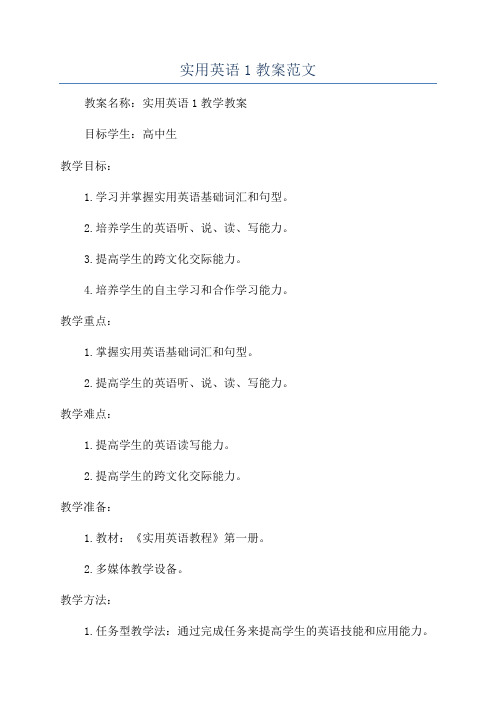
实用英语1教案范文教案名称:实用英语1教学教案目标学生:高中生教学目标:1.学习并掌握实用英语基础词汇和句型。
2.培养学生的英语听、说、读、写能力。
3.提高学生的跨文化交际能力。
4.培养学生的自主学习和合作学习能力。
教学重点:1.掌握实用英语基础词汇和句型。
2.提高学生的英语听、说、读、写能力。
教学难点:1.提高学生的英语读写能力。
2.提高学生的跨文化交际能力。
教学准备:1.教材:《实用英语教程》第一册。
2.多媒体教学设备。
教学方法:1.任务型教学法:通过完成任务来提高学生的英语技能和应用能力。
2.互动式教学法:通过师生互动和小组合作,培养学生的合作学习能力和跨文化交际能力。
教学过程:Step 1:导入 (5分钟)教师通过展示图片和提问的方式导入新课,引发学生对实用英语的兴趣。
Step 2:单词学习 (10分钟)教师通过多媒体展示单词,并配以发音,引导学生学习和记忆新词汇。
教师还可以设计各种游戏和活动,让学生在轻松中记忆和巩固单词。
Step 3:听力训练 (15分钟)教师播放一段对话或独白,要求学生仔细听并回答问题。
教师可以在听力过程中给予适当的提示和指导,帮助学生提高听力技能。
Step 4:口语训练 (15分钟)教师设计各种情景对话和角色扮演活动,让学生进行口语练习。
教师可以提供一些话题和问题,引导学生进行对话,并给予适当的语言和发音指导。
Step 5:阅读训练 (15分钟)教师指导学生阅读一篇短文,并进行理解和表达训练。
教师可以提出一些问题,引导学生进行讨论和思考,培养学生的理解和表达能力。
Step 6:写作训练 (15分钟)教师引导学生进行写作训练,可以让学生完成一篇短文或写一封电子邮件。
教师可以提供一些写作指导和范文,帮助学生提高写作技能。
Step 7:文化交流 (10分钟)教师通过展示图片、视频或讲解等方式介绍英语国家的文化和习俗,引发学生的兴趣并提高学生的跨文化交际能力。
Step 8:总结 (5分钟)教师引导学生对本节课的内容进行总结,对学生的表现给予肯定和鼓励,并展望下节课的内容。
应用型大学英语综合教程第一册第一章课件
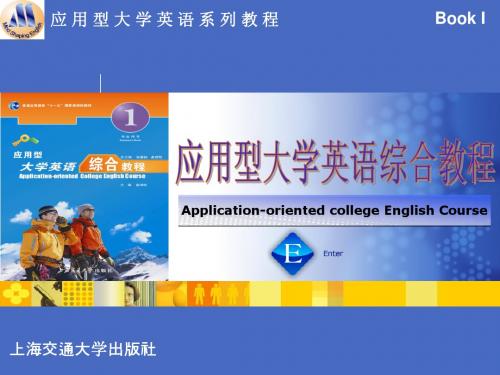
Book I
Application-oriented college English Course
上海交通大学出版社
Course Description
Expectation: Finish every task on time Be brave and active in discussion Don't be shy and try to make learning fun together
Back
上海交通大学出版社
Next
Text Lead-in
Text Organization
Introduction (Para.1)
5
Introduction to the hero of the story: Monty Roberts, who owns a horsehe teacher failed him and required him to rewrite the paper.
Monty persevered in his dream until he realized it.
Conclusion (Para. 10) Don’t let anyone steal your dreams. Follow your heart, no matter what.
6
put on:at 1)risk 举办(展览等);演出 ranch: 牧场 youth programs: youth at 不要让别人偷走你的梦想 fund-raising: 筹募基金活动 (戏剧) risk refers to those young who e.g. He is dreaming ofpeople owning a Meaning: He has allowed me to e.g. A charity walklooked is a fund-raising 1 我有个朋友叫蒙蒂·罗伯兹,他 are not properly after or e.g. The gallery will put on an ranch in North America. collect funds to finance social services event. 在圣伊斯德罗有个牧马场。他把住宅 educated and have a tendency to exhibition ofa his latest works offers this Note that large ranch for those young people who are in danger 借给我举办募款活动,为问题青少年 commit wrongdoingscampaign such as being The fund-raising was weekend. horseback riding, rafting, fishing, and of going astray/becoming juvenile 项目筹备基金。 addicted to alcohol, drugs, and so on. kicked off by a tours; millionaire. 2) 穿上,戴上 mountain bike owning delinquents (青少年犯罪分子 ). a ranch at risk: 有危险,有风险 may be the life-long dream for many e.g. The fire suddenly broke out. Americans. e.g. didIfnot wehave go to She thewar, timeinnocent to put lives will socks on. be put at risk.
- 1、下载文档前请自行甄别文档内容的完整性,平台不提供额外的编辑、内容补充、找答案等附加服务。
- 2、"仅部分预览"的文档,不可在线预览部分如存在完整性等问题,可反馈申请退款(可完整预览的文档不适用该条件!)。
- 3、如文档侵犯您的权益,请联系客服反馈,我们会尽快为您处理(人工客服工作时间:9:00-18:30)。
Unit OneA Teaching Objectivesa. Contents of the text:Focus 1: Help the students learn a lesson from the story—Look beyond the obvious and allow miracles to be created in our life.Focus 2: The importance and necessity of crying.b. Key language points in the text:Focus 1: 1. Words such as graduate, purchase, hand,regret,desire may function both as a verb and a noun.2. Present participle used as adverbials of time, cause and result, etc.3. Absolute construction introduced by the preposition with.c. Vocabulary:Focus 1: 31 B-level words, 11 A-level words, and 4 phrases and expressions listed under Vocabulary.Focus 2: 30 B-level words, 20 A-level words, and 8 phrases and expressions listed under Vocabulary.d. Comprehensive skills:Understand a passage at the pre-intermediate level of difficulty and on this basis, be able to write a summary of the text.e. Functions:Focus 1: Expressing Thanks.Focus 2: Writing a Thank-you Letter.B Procedures and MethodsEight teaching periods are needed to cover the present unit.1. Period One and Period Two:Step One:a. Background information:Graduation Day in the West “There’s a time for joy/A time for tears/A time we’ll treasure through the years/We’ll remember always Graduati onDay…” This is a song entitled Graduation Day by Beach Boys. For graduates and their families, Graduation Day marks a unique moment in time: a celebration of years passed, while looking forward to the endless possibilities of the countless hours that lay ahead. To celebrate, a ceremony is usually held at school on which students wear cap and gown for this special moment and the song “Pomp & Circumstances” is the standard march. At home, parents usually throw a party for their children and special gifts are also necessary.b. warm-up questionsHow is the relationship between you and your father?What is the best gift you have ever received from your father?(The warm-up exercise shall not take up more than 8 minutes.)Step Two: Go over the key words and expressions in the text.Step Three: Start to teach the text para. by para. Help students understand the text and explain language points meanwhile. Questions about Para. 1(1) What was the young man in our story getting ready to do?(2) What did he want from his father as a gift for him?(3) Could his father afford it?Notes of Para 1:A young man was getting ready to graduate from college. 一个年轻人即将从大学毕业。
get ready to do sth.: to get prepared to do sth. 准备好做某事该词组在本句中用进行时态,表示“正准备”的意思,意指通过了所有课程,完成了学业。
e.g. (1) We’d better get ready to leave. 我们最好准备出发吧。
(2) The children are getting ready to go to school. 孩子们正准备去学校。
graduate:vi. to complete education at a school or a university 毕业e.g. (1) He graduated from Beijing University in 1998. 他1998年毕业于北京大学。
(2) When did you graduate from Oxford? 你什么时候从牛津大学毕业的?graduate还可以作可数名词,意为“a person who has completed a university degree(大学)毕业生,研究生”K nowing his father… could well afford it:为现在分词短语作状语,表示原因,相当于Beca use he knew his father… could well afford it。
现在分词knowing后是个宾语从句his father…could well afford it. 宾语从句中主语为his father,a faithful Christian是主语his father的同位语,who owned a prosperous business 是定语从句,修饰名词Christian。
e.g. Not knowing what to do, he phoned the police.(因为)不知道该怎么办,他给警察打了电话。
a faithful Christian…:作father的同位语。
faithful: a. having and keeping faith in one person, idea, belief, etc. 忠诚的,忠实的;如实的e.g. (1) One cannot be too faithful to one’s duty.对自己的职责无论怎样忠诚也不为过。
(2) It is a faithful report. 这是一个如实的报告。
faithful 的词根为名词faith,意为“feeling sure that you can trust someone or something 信任,信心;信仰”。
e.g. (1) Have you any faith in what he says? 你相信他说的话吗?(2) Do you have faith in Tim? 你相信蒂姆吗?(3) Christians have faith in God. 基督教徒信仰上帝。
afford: vt. to be able to buy or pay for 买得起,负担得起e.g. (1) This sofa is expensive. I am afraid that I can’t afford it.这张沙发很贵,我恐怕买不起。
(2) Can we afford a holiday abroad this year? 今年我们负担得起出国度假吗?afford 作动词的另一个常用意思为“to provide, to give 提供,给予”。
e.g. The tree afforded us a shelter from the rain. 这棵树为我们提供了避雨的地方。
宾语从句that was all he wanted作为told的直接宾语,前面省略了宾语从句的连接代词that,而句中的指示代词that指的是汽车。
all 后面省略定语从句关系代词that,本句的完整形式应为(that) that was all (that) he wanted。
Questions about Para. 2(4) What did his father hand him on the morning of his graduation?(5) What did he find in it?(6) How did he feel as he saw the gift?(7) What did he do then?Notes of Para 2:approach:vi./vt. to come near or nearer 靠近,接近e.g. (1) As summer approached, the weather became hotter. 随着夏天的临近,天气变得热些了。
